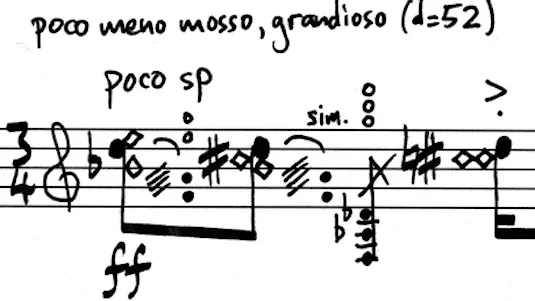
Fundamentals of Music Theory 
Learn the basics of Fundamentals of Music Theory ▼
ADVERTISEMENT
Course Feature
![]() Cost:
Cost:
Free
![]() Provider:
Provider:
Coursera
![]() Certificate:
Certificate:
Paid Certification
![]() Language:
Language:
English
![]() Start Date:
Start Date:
4th Sep, 2023
Course Overview
❗The content presented here is sourced directly from Coursera platform. For comprehensive course details, including enrollment information, simply click on the 'Go to class' link on our website.
Updated in [March 06th, 2023]
Learners can learn the basics of music theory from this course, such as pitches and scales, intervals, clefs, rhythm, form, metre and time signatures, phrases and cadences, and basic harmony. They can also gain an understanding of how to read and write Western music notation, as well as how to analyse and listen informedly. Additionally, the course provides an overview of more advanced concepts, such as chord progressions and modulation, which can help learners to further their knowledge and skills.
[Applications]
Those who have completed this course can apply their knowledge to a variety of musical activities, such as composing, arranging, and performing music. They can also use their understanding of music theory to better appreciate and analyse music, and to develop their own musical style. Additionally, they can use their knowledge to teach music theory to others.
[Career Paths]
1. Music Composer: Music composers create original music for a variety of mediums, such as film, television, video games, and live performances. They must have a strong understanding of music theory and composition techniques, as well as the ability to work with a variety of musical styles. With the rise of streaming services and digital media, the demand for music composers is increasing, making this a great career path for those with a passion for music.
2. Music Producer: Music producers are responsible for overseeing the production of music recordings. They work with artists to create the best possible sound, and are responsible for selecting the right instruments, recording techniques, and mixing and mastering the final product. With the rise of digital music production, the demand for music producers is increasing, making this a great career path for those with a passion for music and technology.
3. Music Educator: Music educators are responsible for teaching music theory, composition, and performance to students of all ages. They must have a strong understanding of music theory and composition techniques, as well as the ability to work with a variety of musical styles. With the rise of online education, the demand for music educators is increasing, making this a great career path for those with a passion for teaching and music.
4. Music Therapist: Music therapists use music to help people with physical, emotional, and mental health issues. They must have a strong understanding of music theory and composition techniques, as well as the ability to work with a variety of musical styles. With the rise of mental health awareness, the demand for music therapists is increasing, making this a great career path for those with a passion for music and helping others.
[Education Paths]
1. Bachelor of Music: A Bachelor of Music degree is a great way to gain a comprehensive understanding of music theory and its application. This degree typically covers topics such as music history, composition, performance, and music technology. It also provides students with the opportunity to specialize in a particular area of music, such as jazz, classical, or popular music. As the music industry continues to evolve, the demand for music professionals with a Bachelor of Music degree is increasing.
2. Master of Music: A Master of Music degree is a great way to further your knowledge and skills in music theory and its application. This degree typically covers topics such as music history, composition, performance, and music technology. It also provides students with the opportunity to specialize in a particular area of music, such as jazz, classical, or popular music. With the increasing demand for music professionals with a Master of Music degree, this degree is becoming increasingly popular.
3. Doctor of Musical Arts: A Doctor of Musical Arts degree is the highest level of music education available. This degree typically covers topics such as music history, composition, performance, and music technology. It also provides students with the opportunity to specialize in a particular area of music, such as jazz, classical, or popular music. With the increasing demand for music professionals with a Doctor of Musical Arts degree, this degree is becoming increasingly popular.
4. Music Technology: Music technology is a rapidly growing field that combines music theory and technology. This degree typically covers topics such as music production, sound engineering, and music software. It also provides students with the opportunity to specialize in a particular area of music technology, such as audio engineering, music production, or music software development. With the increasing demand for music professionals with a degree in music technology, this degree is becoming increasingly popular.
Course Provider

Provider Coursera's Stats at AZClass
Discussion and Reviews
0.0 (Based on 0 reviews)
Explore Similar Online Courses

The Complete Instagram Marketing Course for Beginners 2018

C Programming: Getting Started - 1

Python for Informatics: Exploring Information

Social Network Analysis

Introduction to Systematic Review and Meta-Analysis

The Analytics Edge

DCO042 - Python For Informatics

Causal Diagrams: Draw Your Assumptions Before Your Conclusions

Whole genome sequencing of bacterial genomes - tools and applications

Orchestral Music Composition & Music Theory for Video Games

Music Theory for Songwriters: From Beginner to Producer

Music Theory Level 1: Part Five
 Related Categories
Related Categories
 Popular Providers
Popular Providers
Quiz
 Submitted Sucessfully
Submitted Sucessfully
1. What is the purpose of this course?
2. What is the target audience of this course?
3. What topics will be covered in this course?


Start your review of Fundamentals of Music Theory